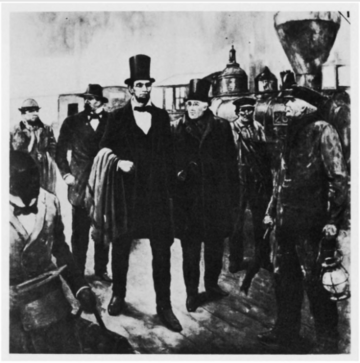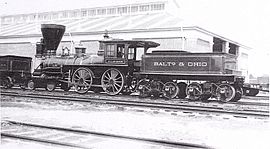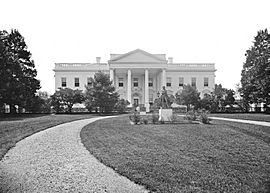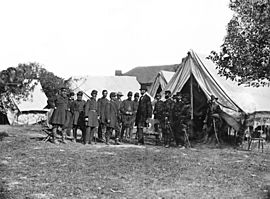William Henry Johnson (valet) facts for kids
William Henry Johnson (born March 4, 1833 – died January 28, 1864) was a free African American man. He worked closely with Abraham Lincoln, who later became President of the United States. Johnson was Lincoln's personal helper, also known as a valet.
Johnson first worked for Lincoln in Springfield, Illinois. He then traveled with Lincoln to Washington, D.C. when Lincoln was elected President in 1861.
In Washington, Johnson had several jobs. He worked part-time as Lincoln's helper and barber. Later, because of problems with other staff at the White House, he became a messenger for the Treasury Department. He earned US$600 a year.
In November 1863, Johnson traveled with Lincoln to Gettysburg, Pennsylvania. This was where Lincoln gave his famous Gettysburg Address speech. During this trip, Lincoln started to feel sick with smallpox. At that time, many people in Washington, D.C., including Lincoln's son Tad Lincoln, had smallpox. Johnson took care of Lincoln. By January 12, 1864, Johnson himself became very ill. He died within a few weeks.
Contents
William Henry Johnson's Early Life
Johnson's mother was an enslaved woman. While living in Washington, D.C., William Henry Johnson started his own family. A historian named Dick Hart has tried to find more information about Johnson's life in Springfield, but it has been difficult. Lincoln even helped Johnson by guaranteeing the mortgage on his house. This means Lincoln promised to pay if Johnson couldn't.
Working for President Lincoln
Abraham Lincoln hired William Henry Johnson as a helper and driver in Springfield, Illinois. This was around the time Lincoln was running for president in 1860. On May 19, 1860, the Lincolns hosted an event at their house in Springfield. Johnson helped by announcing guests as they arrived and showing them to meet Abraham and Mary Todd Lincoln. Before or during his time with Lincoln, Johnson also worked as a shoe shiner and barber.
Lincoln brought Johnson with him to the White House for his first inauguration. During the train journey, reporters noticed how careful and watchful Johnson was. He acted like an unofficial bodyguard for Lincoln. Lincoln said that Johnson was a good and loyal man.
To avoid a plan to harm him, called the Baltimore Plot, Lincoln secretly left his expected train. He boarded another train from Harrisburg, Pennsylvania to Washington, D.C. This transfer happened in the dark in Baltimore. Lincoln's lawyer friend, Ward Hill Lamon, was the only person known to have traveled with Lincoln on this dangerous part of the trip. There is no record that Johnson was with them during this secret journey.
Johnson worked for Lincoln in many ways. He was a barber, helper, handyman, messenger, and even a bodyguard. Lincoln once said that Johnson was "the most useful member of the presidential party." Lincoln trusted him to deliver messages and sometimes large amounts of money.
Other White House servants did not treat Johnson well. They were not happy about new people joining the staff. They also did not like that Johnson was a dark-skinned African American. Before him, all the White House servants had lighter skin. It became clear very quickly that Johnson needed a different job.
Lincoln first asked the Secretary of the Navy, Gideon Welles, for help, but no suitable job was found. In the meantime, Johnson continued his work, often running errands outside the mansion. At Lincoln's request, the Secretary of the Treasury, Salmon P. Chase, gave Johnson a job in late 1861. He started as a laborer and soon became a messenger.
If Lincoln needed Johnson's help, he would send a message to Johnson's supervisor at the Treasury. Before starting his work at the Treasury each morning, Johnson would go to the White House. He would shave and help Lincoln get dressed. This work gave Johnson extra money.
Historian John E. Washington wrote about Lincoln's care for Johnson:
I think Lincoln's constant interest in William Johnson shows us, even more than do some of his greatest public deeds and much heralded acts, the great heart of this man. He had induced Johnson to leave Springfield and accompany him to Washington on a most perilous journey and thereafter never ceased to be interested in him, but continued to assist him in every manner possible.
—John E. Washington, They Knew Lincoln
It is believed that Johnson was treated fairly by Lincoln. Frederick Douglass, a famous black abolitionist, said that Lincoln was the first important person he talked with who did not make him feel different because of his skin color. However, in some letters, Lincoln referred to the 27-year-old Johnson as a "colored boy."
In 1862, Johnson went with Lincoln to the Antietam Battlefield after the battle had ended. He also joined Lincoln on other trips.
William Henry Johnson's Illness and Death
During the winter of 1863–1864, a smallpox outbreak happened in Washington, D.C. On November 18, 1863, Johnson traveled by train with Lincoln to Gettysburg, Pennsylvania. They were going for the dedication of the Gettysburg National Cemetery. Lincoln was going to give the Gettysburg Address there. On the train ride, Lincoln looked tired and sick.
Lincoln's son, Tad, had smallpox on the day Lincoln left for Gettysburg. This meant Mary Todd Lincoln could not travel with the President.
During his speech, newspaper reporters said Lincoln looked "listless" and "sweating." On the way back, Lincoln went to bed on the train with a bad headache. Johnson helped him by putting cold water on his forehead.
Lincoln's illness was called "Varioloid," which is a mild form of smallpox. For a long time, people thought it was only a mild case. But recent studies suggest it was a serious illness. Lincoln was in bed and slowly got better by December 15.
Johnson took care of Lincoln during his sickness. Sadly, Johnson caught smallpox himself and died in mid-January 1864. Lincoln paid off the mortgage on the Johnson family's house. He also sent money to Johnson's family. Lincoln had co-signed a loan for Johnson, and he paid off half of it. The banker then canceled the other half of the debt.
Where William Henry Johnson Was Buried
Lincoln also paid for Johnson's burial. The exact place where Johnson was buried is not known for sure. Many stories say his grave is in Arlington National Cemetery. However, these stories are based on an idea by a historian named Roy P. Basler, which might not be correct.
In 1972, Basler thought Johnson was buried in grave number 3346 in Section 27 of Arlington National Cemetery. There is a headstone there for a "William H. Johnson, Citizen." But in 1977, Basler admitted he had no real proof. He had just searched Arlington "on a hunch."
Later, in 2012, Phillip W. Magness and Sebastian N. Page looked into this more. They found that "Citizen" was written on all headstones in Section 27 at Arlington. It was used to mean "Civilian" for a short time before the cemetery became only for military members. Also, the headstone seen today was put up in the 1990s, not by Lincoln. Johnson's name was also very common, making it hard to be sure. When Johnson died, Arlington was not yet officially a cemetery. It is more likely that Johnson was buried in Columbian Harmony Cemetery, which was later moved.
William Henry Johnson in Movies
William H. Johnson was a character in the 2012 movie Abraham Lincoln: Vampire Hunter. He was played by actor Anthony Mackie. In the film, Lincoln and Johnson are shown as childhood friends. The movie shows a young Lincoln helping a young Johnson who is being whipped. Johnson then works in the White House and helps President Lincoln fight against vampires.
 | Jessica Watkins |
 | Robert Henry Lawrence Jr. |
 | Mae Jemison |
 | Sian Proctor |
 | Guion Bluford |





